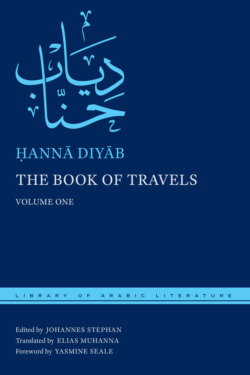Читать книгу The Book of Travels - Hannā Diyāb - Страница 8
На сайте Литреса книга снята с продажи.
ОглавлениеAcknowledgments
Editor’s acknowledgments
I wish to express my sincere gratitude to those colleagues who helped me during the process of preparing this edition and added to my understanding of the text and its context. Altogether, this work is the outcome of a physical and mental voyage over almost a decade. I wish to first of all thank Reinhard Schulze in Bern (Switzerland), who directed me to the scarcely studied group of texts written by Maronite travelers from Aleppo during the mid-eighteenth century. Leafing through Georg Graf’s famous reference work, itself a time machine through early modern and modern Ottoman history, I noticed Ḥannā Diyāb’s text, attributed to “Anonymous.” That sparked my curiosity. In the years to follow and with the support of the University of Bern I was able to travel to Lebanon and to the Vatican to see The Book of Travels, as well as to Germany, to the Forschungsbibliothek in Gotha to consult manuscripts from Ḥannā Diyāb’s time. I wish to thank the Orient-Institut Beirut for their support during my stay as a researcher there in 2013. I was able to gain insight into numerous collections of manuscripts from the early modern period in Lebanon. My stay in Lebanon brought me in touch with the Bibliothèque Orientale at the Université de Saint-Joseph in Beirut, where employees Magda Nammour and Karam El Hoyek in particular helped with the consultation of manuscripts relevant to this project.
Over the years of working on my PhD thesis on Ḥannā Diyāb and this edition I enjoyed informative conversations with Ibrahim Akel, Bernard Heyberger, Paule Fahmé-Thiéry, and Hilary Kilpatrick, among others, during my trips to Denmark, France, and Switzerland. All of them shared important perspectives on the material at hand. For help with the preparation of the edition I wish to thank Ziad Bou Akl and Enass Khansa as well as my students in Bern for sharing their impressions on the tone, style, and linguistic register of the text. Thanks also to Elias Muhanna and Michael Cooperson for the fruitful exchange and for the efficient collaborative process; the same goes for the whole Library of Arabic Literature crew for their support of this project. I also wish to express my gratitude to everyone at the Kalīla and Dimna – AnonymClassic project, where I currently hold a research post, notably Beatrice Gründler and Isabel Toral who are interested in the continuation of my research on the Middle Arabic register. Special thanks, lastly, go to my partner Feriel who during our holidays followed my geeky attempt to find the “Tower of Skulls,” without any doubt one of today’s most thrilling sights in Houmt Souk (Djerba, Tunisia).
Translator’s acknowledgments
For Laila and Maya
I wish to express my gratitude to the many individuals whose contributions have enriched this book. Johannes Stephan has been all that one could ask for in a co-author, and Michael Cooperson’s erudition and wit have improved our work immeasurably. I’m grateful to Paolo Horta for helping to interest the Library of Arabic Literature in the manuscript, to Philip Kennedy and the rest of the Editorial Board for their faith in the project, and to an anonymous reviewer for many helpful suggestions. Chip Rossetti, Lucie Taylor, and the production team have taken scrupulous care of our work. I would like to thank Professors Hilary Kilpatrick and Jérôme Lentin for introducing me to Diyāb’s manuscript many years ago. Finally, I thank my wife Jen, whose discernment has caught many an unmusical phrase, and my daughters Laila Rose and Maya, whose love has kept me whole when, as Diyāb would say, the world seemed to crowd in upon my miserable self.
